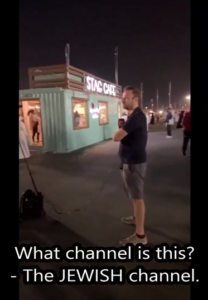The 2022 FIFA World Cup in Qatar is likely to be remembered as one of the more politically–charged international sports competitions of recent decades. It seems that even Western news agencies are taking part in the political games, abandoning their professional role as impartial observers on the sidelines.
Thus, on two separate occasions since the commencement of the games, AFP’s Arabic reporting from Qatar significantly diverged from the agency’s coverage in English, French and Spanish. In both cases, the Arabic reports concealed facts that were unflattering to the competition’s Qatari regime organizers, namely the way fans and authorities treated foreign sports journalists.
The first Arabic report, from Nov. 28, completely whitewashed the abuse directed at Israeli journalists and fans in Qatar during the tournament. After quoting an middle-aged Israeli fan, who said he feels “like I’m watching the World Cup in disguise. The atmosphere towards us is hostile,” AFP then falsely reported: “But with the exception of refusing to speak to Israeli media, no incidents against Israelis during their stay in Qatar have been reported.”
The English, French, Spanish and Portuguese versions of the same report did not contain this fabrication intended to undermine the Israeli’s statement about the hostility hurled at Israelis.

World Cup fans direct antisemitic remarks at Channel 13 (Israel) reporter Tal Shorrer, Nov. 12, 2022 (Footage from Remee’s Twitter account, with translation by CAMERA Arabic)
In fact, Israeli journalists encountered, documented and reported fans’ attempts to disrupt their broadcasts and intimidate them, including with the use of antisemitic slurs. The Qatari security services’ tolerance of this harassment targeting Israelis stands in stark contrast to the widely-reported clamp down against peaceful fans publicly expressing political opinions unrelated to the Israeli-Palestinian conflict.
AFP’s Dec. 10 Arabic report covered the tragic death of American sports journalist Grant Wahl, who dropped dead during the Dec. 9 match between Argentina and the Netherlands.
Unlike the English, French, Spanish, German and Chinese versions of the same report, the Arabic edition completely omitted the fact that Qatari police had earlier detained Wahl because he sported a rainbow t-shirt supporting the LGBTQ community. The English text, but not the Arabic, had reported:
In their statement [regarding Wahl’s death, Qatar’s World Cup] organisers did not mention an incident just before the November 21 group match between the United States and Wales when Wahl was stopped as he entered the stadium for wearing a rainbow shirt in support of LGBTQ rights.
This information potentially assumes new relevance and urgency in light of Wahl’s brother’s claim that the sports reporter was killed because of his protest in support of gays.
Notably, an earlier, shorter version of the Arabic report did initially mention the incident in passing, but AFP’s later story ignored it completely, despite the fact that the follow up article was longer.
Other Arabic-language Western media outlets did report the noteworthy information about Wahl’s detainment, among them CNN, BBC, Alhurra and Independent Arabia (via Reuters Arabic).
Although CAMERA Arabic quickly contacted AFP regarding the shortcomings in both Arabic reports, the news agency failed to amend the articles in line with their own coverage in other languages.
AFP’s failure to address disparities between its Arabic coverage and its reporting in other languages became a pattern long before the current championship. Corrections are few and far between, with Arabic reports typically remaining uncorrected.
